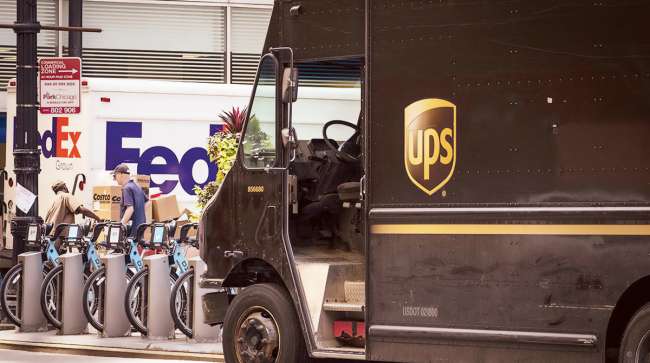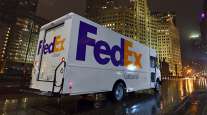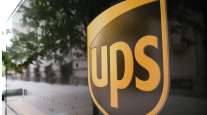Bloomberg News
Consumers Switch to Slower Shipping, Squeezing UPS, FedEx

[Stay on top of transportation news: Get TTNews in your inbox.]
Packages no longer absolutely, positively have to get there overnight.
More people are switching to slower delivery options to save money, and profits at FedEx Corp. and UPS Inc. are getting squeezed.
The two biggest shipping firms in the U.S. recently cut their forecasts, blaming the shortfall in part on customers turning to cheaper options, like ground shipping instead of air delivery. The trend may be a warning sign ahead of the holiday season and upcoming earnings reports.
UPS ranks No. 1 and FedEx No. 2 on the Transport Topics Top 100 list of the largest for-hire carriers in North America.
Sean Lesczynski stopped using expedited shipping two years ago to get parts for the custom bikes he builds in Brooklyn. It was just too expensive for his customers, and they didn’t mind waiting a few more weeks to get their new set of wheels.
“It sounds counterintuitive to say like, someone’s going to spend $5,000 on a bike, but they don’t want to spend an additional $500,” Lesczynski said. “But for a lot of people, that is actually the make-or-break difference in terms of how they rationalize or conceptualize that big purchase.”
Demand for expedited shipping has fallen every year since 2021. At UPS, average daily volume for domestic next-day air services fell 7.1% in its most recent quarter, compared with the prior year. At FedEx, priority packages were down 5% last quarter. Meanwhile, the companies say that cheaper shipping options are growing in many markets.
The shift has rattled investors. UPS shares are down 14% this year and FedEx is up 7%, compared with a 22% gain for the S&P 500 Index.
Early signals suggest that the holiday gift-buying season — the busiest time of year for shippers — won’t bring a turnabout.
Shoppers are buying presents earlier than ever this year, in part to save money on shipping, according to a recent survey of more than 1,300 consumers in North America and the U.K. by Project44, a supply chain software company. Two-thirds of the people surveyed said they plan to spend less on gifts this year, and of them, one in four said shipping costs were their top concern.
“Consumers are stressed,” said Gordon Glazer, senior consultant at logistics firm Shipware. “Families are doing everything that they can to reduce costs, and they’re willing to wait longer to receive products to do so.”
There are only 17 shipping days between Black Friday and Christmas Eve this year, so UPS has been pitching cost-conscious shoppers to plan ahead to save money. Both UPS and FedEx add surcharges to peak season prices.
Amanda Peleman has an Etsy business in the Detroit area where she sells calligraphy paper goods, such as gift tags and place cards for weddings. She’s had to raise her shipping fees by as much as 20% this year to keep up with rate increases from the U.S. Postal Service.
“A lot of people, more so now, choose the slower shipping options, even on orders where they need them by a certain date,” said Peleman. “That stresses me out.”
Price isn’t the only reason people are eschewing expedited shipping. Faster delivery can make it tougher to consolidate cargo, resulting in more greenhouse gas emissions and air pollution.
At Grove Collaborative Holdings, an online marketplace for eco-friendly home supplies and personal care, customers are increasingly asking about free shipping but they’re mostly concerned about the environment, according to Terrance Underwood, vice president of fulfillment operations.
“Shipping time is a secondary priority compared to sustainability for Grove customers,” he said in an email.
The move away from speed has created an identity crisis of sorts for FedEx. The company’s founder, Fred Smith, launched Federal Express in 1971 with the radical idea that you could deliver packages overnight by flying them in and out of a central hub. The delivery service became known for its television ad slogan: “When it absolutely, positively has to be there overnight.”
UPS, a much older company, developed its air cargo business in fits and starts throughout the 20th century, eventually launching its own airline in the late 1980s to compete with FedEx. The two have remained rivals, building relationships with shippers to offer ever-faster — and costlier — delivery options.
The rise of Amazon.com Inc. fed into this demand as consumers grew accustomed to packages arriving in two days, then one day or even within a few hours. This trend continued in the early days of the pandemic as Americans stocked up on cleaning supplies and items to spruce up their homes.
Amazon ranks No. 1 on the Transport Topics Top 100 list of the largest logistics companies in North America and No. 1 on the TT Top 50 Global Freight carriers list. It also ranks No. 12 on the TT Top 100 private carriers list.
But once supply chain disruptions took hold and shortages hit everything from bicycles to delivery vans, people no longer expected their orders to arrive the next day; they were thrilled to get them at all. Acceptance of longer delivery times has lingered since then, which Glazer calls “the COVID hangover.”
Want more news? Listen to today's daily briefing above or go here for more info
For its part, Amazon has also been training people to get used to slower shipping by providing incentives to shoppers who don’t opt for two-day or next-day delivery. More recently, Chinese e-commerce brands Shein and Temu have taken off in the U.S. by offering ultra-cheap clothes, electronics and household items with the tradeoff that shipping times can take a week or more.
Shein and Temu are helping to drive demand for low-cost shipping services such as UPS’s SurePost, which the company advertises for “non-urgent, business to consumer needs of low value.”
UPS addressed SurePost’s growth on an earnings call in July, with CEO Carol Tomé saying that “volume has been quite explosive” from “two new e-commerce customers that came into our network, and you can imagine who they are.”




